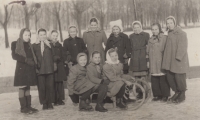Let’s appreciate what our parents and grandparents built before us
Download image
Marie Fifková was born on September 20, 1944 in Mikulčice in South Moravia. At the time, her father, František Zelinka, worked in Slovakia as a repairman of steam locomotives, her mother, Ludmila, was a housewife and took care of their small farm. The family lived in poor conditions in Marie’s grandparents’ house, where eight people lived crammed into a two-room apartment. At the beginning of the 1950s, the Zelinka family started to build their own house, but during the currency reform of 1953 they lost most of their savings. Marie was a witness to violent collectivization efforts, when peasants from Mikulčice lay down in front of tractor wheels to prevent the plowing of the borders of their fields. Due to the fact that her parents refused to join the Unified Agricultural Cooperative (JZD – Jednotné Zemědělské Družstvo), she could not go to the high school she chose in Hodonín in order to help her parents’ financial situation. She, thus, had to go to a secondary nursing school in Gottwaldov, from where she graduated with straight As in 1962 and became a children’s nurse. She dedicated her whole life to working with children. Even under the communist regime, she became the head of a nursery school in Hodonín, and in the early 1990s, when there was a trend of closing down nurseries, she fought for their preservation. At that time, she helped establish a day care center for children with disabilities, which she then ran for the next twelve years. In 2021, she and her husband Zdeněk lived in her native house in Mikulčice, where they were hit by the tornado on June 24, 2021, which completely destroyed part of their building.

